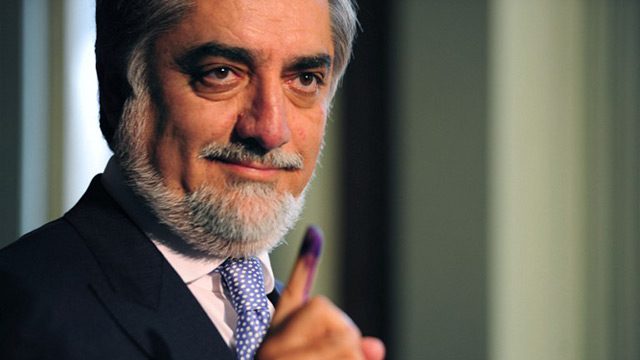SUMMARY
This is AI generated summarization, which may have errors. For context, always refer to the full article.

KABUL, Afghanistan – Afghanistan’s election crisis deepened Thursday, June 19, when presidential candidate Abdullah Abdullah said he would reject the result because his claims of massive fraud have failed to stop the ongoing vote count.
Abdullah’s complaints about alleged fraud in the run-off election Saturday, June 14, have thrown the country’s first democratic transfer of power into turmoil ahead of preliminary results due out on July 2. (READ: Afghan election marred by violence, fraud complaints)
A smooth election was seen as a key benchmark of Afghan progress by the US-led coalition that has fought against insurgents and donated billions of dollars in aid since 2001 when the Taliban regime was ousted.
But the dispute could trigger instability as NATO combat troops withdraw by the end of the year.
“From now onwards, since (the election authorities) have not responded to our legitimate demands… everything they do and the result of their activities will not be accepted by us,” Abdullah told reporters.
Referring to the Independent Election Commission (IEC) and Election Complaints Commission (ECC), he said: “We will not consider these two institutions as legitimate.”
Abdullah had demanded an immediate stop to the vote count and the sacking of Zia-ul-Haq Amarkhail, head of the IEC secretariat, over Amarkhail’s alleged attempt to remove unused ballots from the IEC headquarters on polling day. (READ: Afghan election in peril over Abdullah’s fraud claims)
But the IEC refused his demands, saying it would stick to the schedule in an election that will choose a new president after Hamid Karzai’s 13-year reign.
In a strong statement late Wednesday, June 18, the UN mission had described Abdullah’s earlier decision to suspend cooperation with the IEC as “regrettable”.
The UN warned that if candidates “abandon the legal process and framework and appeal directly to supporters (it) could incite violence”.
“Some people have already called for civil disobedience and some incidents have already taken place,” the UN said, calling for the electoral timetable to be followed.
Abdullah took on Ashraf Ghani in the run-off vote after the two came first and second in an eight-man election on April 5, when Abdullah was well ahead with 45% against Ghani’s 31.6%.
Fears of ethnic tension
About 100 supporters of Abdullah demonstrated in Kabul on Thursday in the first public protests of the crisis, though Abdullah has repeatedly called on his loyalists to show restraint.
Ethnic friction is a concern, as Abdullah’s support is based among the Tajik minority and other northern tribes, while Ghani is a Pashtun – Afghanistan’s largest ethnic group, which is strongest in the Taliban heartlands of the south and east.
Abdullah has focused his fraud claims on the IEC’s estimated turnout of more than seven million voters, which he believes is too high.
On Thursday, he again demanded the explanation for reported figures that suggest more people voted in some volatile eastern provinces than live there.
Abdullah feels massive fraud denied him victory in the 2009 election, and he has often said that only a repeat of ballot-rigging could deny him power this election.
“The responsibility and consequences of this crisis and this political stalemate is on the shoulders of the president and the election commissions,” he said, in a clear attack on Karzai.
Karzai pledged to stay out of the election, and he insisted in public that he had no favored candidate. He was constitutionally barred from standing for a third term.
Both Abdullah, a former anti-Taliban resistance fighter, and Ghani, a ex-World Bank executive, worked as ministers under Karzai, but now have a prickly relationship with their former boss.
After the poll closed, the White House praised voters’ courage and called the elections “a significant step forward on Afghanistan’s democratic path”.
Eleven voters in the western province of Herat had their fingers – which were dipped in ink to register their ballot – cut off by insurgents.
All NATO combat forces are due to withdraw from the country by December, though 10,000 US troops will remain into next year. – Rappler.com
Add a comment
How does this make you feel?
There are no comments yet. Add your comment to start the conversation.